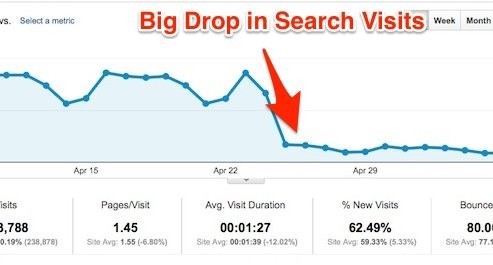If you worked on SEO for your website, you would be delighted to see the website rankings rise and wait with hope for it to reach the much-converted number one position on the SERPs. But instead, you notice the website that was on a steady climb towards the top spot plunges by two to three ranks. What would your reaction be?
You may desperately punch a few keys on your laptop or even restart, hoping it was a glitch that would disappear.
Don’t fret or call a SEO company; website rankings can drop on search engines for various reasons; Find out the reason for the drop, and it will help overcome and get back on top again. This guide details the decline in website rankings on search engine results.
Understanding Website Rankings Drop
After all the trouble you took to bring your website to the position it is today, you would have least expected to see it drop by a few ranks. However, a website ranking drop is no reason to worry, for there could be several reasons causing it, one of which is the ever-changing Google algorithm. Another reason for your website not ranking high as it did is because the site can’t load.
And that’s what happened to Rajesh’s website. He put in his best efforts and spent considerable money on SEO tools and a professional SEO company to ensure that his website was in the first three positions. However, the following day, Rajesh noticed that his website had disappeared from the SERPs.
He panicked and did all his power to raise the rank, but nothing seemed to work. Only on checking the website did he realize that the site would not load; the reason – was a 4-hour DDoS attack that did not let the website load. When the site loaded, it was in position three on the SERPs.
Instead of panicking, it is better to analyze the drop to find out the reasons for it as you get mojo on the website.
Are you Penalized

Sometimes, people stoop low to get their websites to rank higher. However, if Google catches you doing that, it will penalize you by penalizing you. Penalties may be:
Algorithm Penalty
The penalty is difficult to detect as it does not send a message to the GWT and occurs with the Google algorithm change.
Manual Penalty
Google may also impose a manual penalty if it catches you doing anything contrary to their guidelines.
Primary Reasons for Drop in Website Rankings
If there are no significant changes in metrics and the problem appears to be pointing elsewhere, it is only suitable to move on to the next step in determining the primary reason for your SEO drop.
Is Your Link Weak?
A strong link will raise the website’s ranking on the SERPs, while websites with low link profiles generally have low rankings. You can only detect link problems by conducting a link audit on the site.
If you find bad or weak links to your website, you can politely ask whoever put them there to remove them. If they refuse, the only other option would be to use Google’s Disavow Tool to reduce or eliminate the damage to your website by manually bringing down the effect of certain inbound links. However, this particular tool from Google is an option only if there is no other way out.
Have You lost the Link?
Despite several Google algorithm changes, if one thing has not changed, it is the power of backlinks on SEO. The SEO rank may drop if you lose some valuable backlinks working for you. And that can happen when you alter your existing content.
Use a specialized SEO tool like Aherfs to check if you have lost the inbound links that were the sole reason your website made it to the top.
Are you on the Wrong Page?
When the “wrong” page appears on your site, Google does not recognize your intended page as the best place to send your traffic. The repercussion of the appearance of the wrong page is on your user experience, which may suffer, or increased bounce rate, CTR, or engagement metrics may suffer.
The solution is to work to improve the ranking signals of a page for a specific keyword.
Are the Redirects Broken?
Suppose you have been working on a new website or moving from one server to another; the ranking may drop significantly if you don’t have a 301 redirect plan to fall back on. The 302 redirects are like a change of address notice in your workplace that guides them to you at another address. It signals to the search engine that certain pages have moved.
Is Manual Penalty Imposed?
If your website continues to rank poorly on other search engines such as Yahoo or Bing, that may be because Google penalized you. Manual actions are not automated and are not a result of algorithmic changes, and you’ll want to resolve the issue and have the penalty removed, failing which your SEO rank will not improve.
Is There a Change in the Algorithm?
Google’s core updates improve the quality and relevance of its search results. Each major update modifies the formula used by Google to rank web pages. Web pages previously ranked high for their target keywords may now rank low following a core update, while low-ranking pages may now rank high.
Are They User Behaviour-Related Changes in the Search?
Google may prioritize newer results and push static content further down the page, making your ranking fall. You can use Google Trends to see if there have been any changes that could explain the discrepancies in SEO ranking. Adapt your content accordingly to solve the problem.
Did Google Change the UX of Search Pages?
Google’s new ranking algorithm considers the user’s experience (UX). These metrics determine how users perceive their experience on a specific webpage. The Core Web Vitals are real-world, user-centered metrics that assign scores to various aspects of your web pages. These include content and load stability, interactivity, and load time. Each item has its ranking and weight in the Google ranking algorithm.
Suppose the Google Page Experience update decides that the user experience on your website is Subpar; it will not give you a higher rank. Thus it becomes necessary to provide valuable content that can hold the audience’s interest and keep them on your web pages for more prolonged—failure in doing that can result in a lower SEO ranking.
Disparity Because Of Search Locations?
You may have always searched from one location and the same device when logged in. If you Google search without logging in from another location or device, did you know that the results will differ?
Before displaying your search results, Google examines and considers previous sites you have visited, your location, and even your device. You’ll need to double-check your rankings if you search in more than one geographic area.
Is The Competition Getting Better?
Analyze and monitor your competitors’ social media activity, link-building strategies, and content marketing to keep an eye on them. You can also use backlink tools to see if they have received an influx of new backlinks; they may run their own SEO campaign in the background.
Do Your Pages Load Slowly?
Bounce rates increase when pages take longer to load because people do not want to wait. Using real user data, Google’s new PageSpeed Tool ranks pages based on how quickly they load.
Is the Drop Server- Related?
If your site is experiencing server problems, it could be due to a broken caching function or an empty markup served to Googlebot. If SEO ranking matters, you cannot delay in solving server issues.
Examine your server logs for errors, and use Google’s Fetch and Render tool to check the URL on your site to see if it renders or is crawled.
Wrapping Up
You spend much of your resources on SEO. Despite all that, the SEO ranking comes down, and you are at a loss, not knowing what to do next. But, dropping in SEO rankings is expected in the SEO world, and you may have done nothing to warrant it, as the article is clear. So, there is no need to worry or panic. Now that you know the reasons for the SEO ranking drop, you can work around them to better your SEO ranking.



















